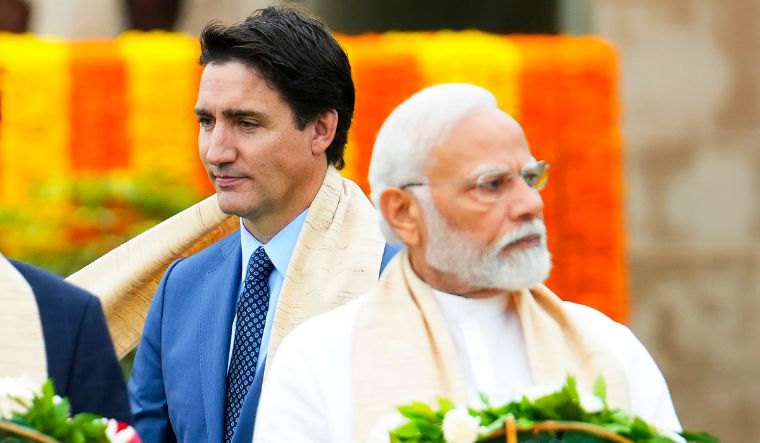Who killed Hardeep Singh Nijjar, the Khalistani separatist wanted by India? Canadian Prime Minister Justin Trudeau accused Indian agents of the crime, but India has vehemently denied it.
It is indeed easy for the world to believe Trudeau’s charge because Nijjar has been remote-controlling several criminal gangs within Punjab. They have been carrying out the criminal activities, but Nijjar has been claiming to be an activist which gives him legitimacy in Canada. Canada’s laws allow such political activity, (even separatist ones ) even if they are frowned upon by countries that are friendly to Canada. Nijjar has been claiming to have been the head of Khalistan Tiger Force (KTF) which has links with Pakistan.
Now reports have started appearing in the media that Pakistan’s ISI might have had a hand in the killing of Nijjar, but then the question arises as to why ISI should kill Nijjar if he was running anti-India operations. The simple logic put forward in these reports is that ISI would have done it to drive a wedge between India and Canada.
However, Indian intelligence experts rule out this possibility. “This theory seems to have been circulated now to deflect attention from India’s concerns about western countries harbouring anti-India elements on their soil,” said a senior officer. “This could very well be an afterthought, as India’s charge against Canada is also a bigger concern of friendly countries harbouring anti-India elements.”
According to security officials in New Delhi, this is an attempt to make the whole Nijjar affair an India-Pakistan issue, instead of an India-Canada issue, which it is.
Indian agencies, who have been keeping a close watch on the banned terror outfits and their operatives on foreign soil, believe Nijjar was killed in a gang rivalry on Canadian soil. “We have been warning Canada about this all along—that these gangsters would become an embarassment for Canada at some point when they start killing each other, and they did not take it seriously,” the officer said. To put the blame on India-Pakistan issues is not acceptable to New Delhi.
India has been sharing dossiers on Nijjar and other Khalistani elements with Canadian Intelligence Security Service as well as the Royal Canadian Mounted Police, but Canada has been ignoring them, said the officer. According to him, the only action that Canada seems to have taken against Nijjar was to put him on a no-fly list.
As per records available with Indian authorities, Nijjar has been conspiring with other Canada-based gangsters like Arshdeep Singh alias Arsh Dalla to instil fear among the largely pro-India Sikh populace in Canada, and also masterminding terror in India. He was allegedly the mastermind behind the Ludhiana bomb blast of 2007; the murder of president of Rashtriya Singh Sangat, Rulda Singh in 2009; the killing of Hindu priest Kamaldeep Sharma in Jalandhar; the explosion in Satya Narayan temple in Patiala in 2010; and the assassination of self-proclaimed spiritual leader Piara Singh Bhaniara alias Baba Bhaniara. They also believe he had hatched plans to target Shiv Sena leaders in 2015-16. He was designated as an ‘individual terrorist’ under Unlawful Activities Prevention Act (UAPA) by the Union Home Ministry on July 1, 2020.
A dossier on Nijjar shared by Indian agencies with their counterparts in Canada says it all. It says Nijjar had fled India on a fake passport on February 19, 1997. He was arrested on landing in Toronto, and his plea for asylum, saying that he was a political refugee, was rejected. He married a British Columbian woman who sponsored his immigration, but again it was rejected as the authorities suspected that his marriage was staged. But subsequently he was given Canadian citizenship and a passport. He visited Pakistan in 2013-14, where he met Jagtar Singh Tara of KTF. In 2015, the ISI is learnt to have roped him in organising secret training camps for Khalistani extremists in Mission Hills in British Columbia, it says.
Indian agencies also suspect him of having links with US-based Gurpatwant Pannun, who is a declared terrorist and founder of the banned Sikhs for Justice. Pannun is said to have used Nijjar’s network to gather support for his pet project Referendum 2020 on Canadian soil. The outcome was visible— Khalistani posters and demonstrations seen in Canada especially during the G20 summit in New Delhi, which prompted diplomats to remind Canadians of their worry.
As many as nine separatist organisations with direct affiliation to terror elements are operating from Canadian soil, according to home ministry records. These include Khalistan Tiger Force (KTF), Sikhs for Justice (SFJ) and Babbar Khalsa International (BKI).


